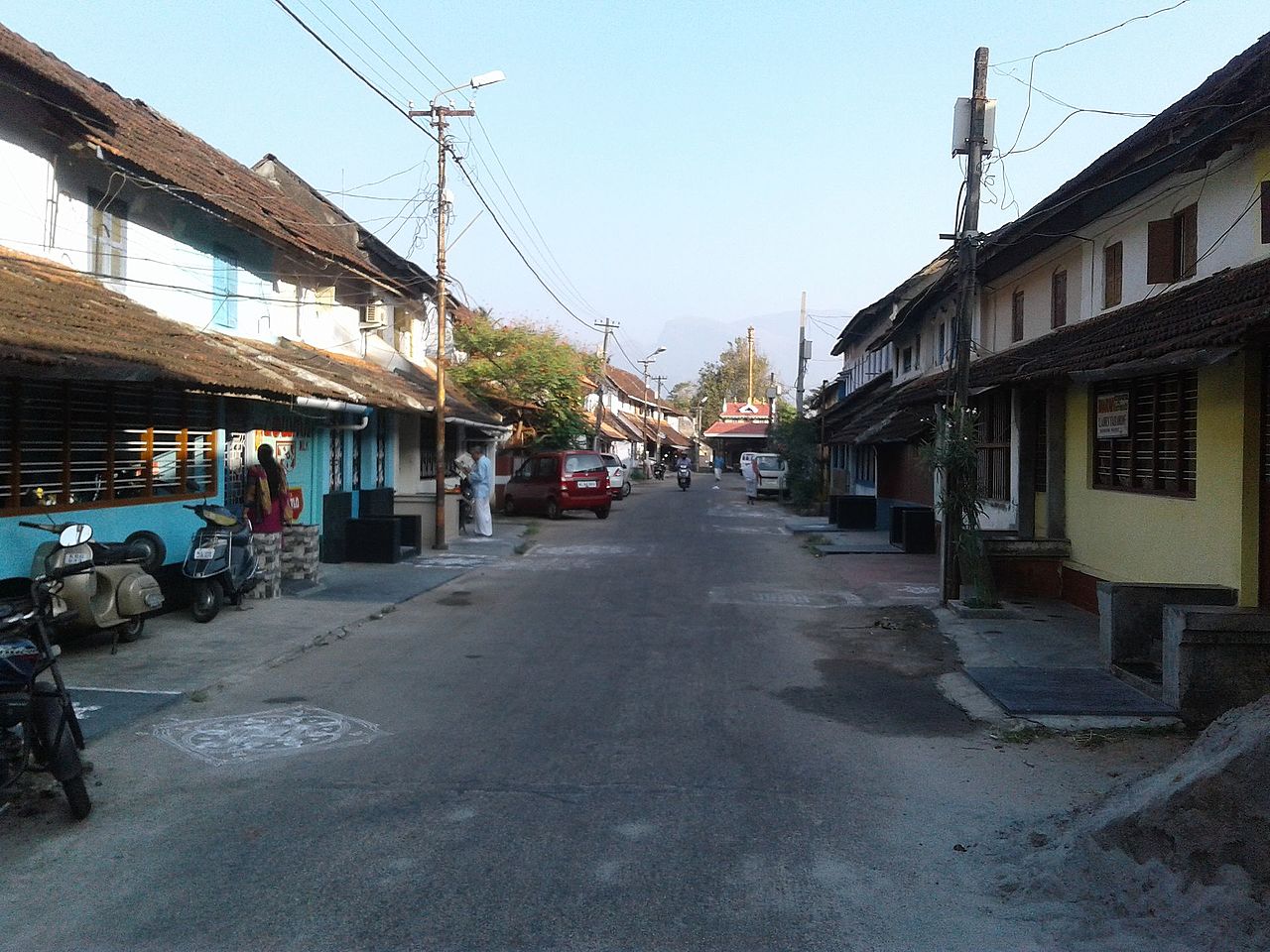A lukewarm response from the Tamil Brahmin community forced the government to include EWS in the scheme, says welfare corporation for forward communities.

An image of Agraharas in Kalpathi, Palakkad district. (Wikimedia Commons)
An article in the CPI(M) mouthpiece, Desabhimani daily, in July 2019 highlighted the plight of Brahmins in Kerala, and the dilapidated condition of agraharams — the community’s rowhouses flanking the streets, mostly leading to a temple.
The article by the late Kodiyeri Balakrishnan, former state secretary of the CPI(M), triggered a heated debate. The validity of the claim was questioned, with several critics asserting that most of the Brahmins were well off and were not living in “slum-like conditions”.
The Left government ignored the criticism and introduced schemes to aid Tamil Brahmins, most of them living in agraharams in Palakkad and Thiruvananthapuram, two districts bordering Tamil Nadu.
The Kerala State Welfare Corporation for Forward Communities floated one such scheme, Bhavana Samunnathi (renovation of agraharams) to help Tamil Brahmins. The government also granted ₹3 crore for the financial year 2022-23.
“Agraharams, the standing relics of a bygone era, have their importance in the cultural and social history of Kerala. These settlements of Tamil Brahmins in Kerala, agraharams are getting dilapidated due to natural conditions,” the Welfare Corporation said on its website.
“Samunnathi will take up the renovation and restoration of selected 200 agraharams in the state. The Kerala Governor mentioned the same while addressing the State Assembly,” it added.
After announcing the scheme, the welfare corporation invited applications from those whose annual income was less than ₹4 lakh.
On 28 December, the government issued an order extending the scheme to the Economically Weaker Sections (EWS) in other forward caste communities. A working group meeting held on 26 November had decided to extend the benefits to the EWS among forward castes.
Officials cited a lukewarm response from Tamil Brahmins as the reason for extending the scheme to other communities. And those who criticised Balakrishnan in 2019, now feel their stand has been vindicated.
The order also stated that the ₹3 crore earmarked for the scheme will be allotted to all forward caste communities under the EWS category. The latest order also stated that those belonging to the EWS category — defined as those with an annual income of less than ₹4 lakh rupees — will be eligible to apply.
Incidentally, the eligibility criteria for the Kerala government’s flagship LIFE Mission project is ₹3 lakh.
South First spoke to Santhosh Kumar SR, the managing director of Kerala State Welfare Corporation for Forward Communities Ltd (Samunnathi).
Confirming the government order, Kumar said: “ I joined as managing director recently, but as far as I understand, applications from agraharams were too less since they are located only in Palakkad and Thiruvananthapuram districts. This is why led the scheme was extended to people from the EWS category.”
He said 164 communities can now avail the benefits of the scheme. He also said that those applicants with a lower income will get priority.
However, according to a source close to the government body, the extension of the scheme to those in the EWS is a “scam”.
“The project was started in 2016 with a budget of ₹2 crore. There have been several applications from the Tamil Brahmin community, and there are at least a hundred applications that are pending with the corporation,” a source told South First, requesting anonymity.
The source said the internal politics in the corporation extended the benefits to the EWS category.
South First also spoke to Akkiraman Kalidas Bhattathirippad, the former president of the Yogakshema Sabha, an association representing Malayali Brahmins.
He opined that there are several poor families in the Brahmin community and he is unaware of why there is a lack of applicants.
“A significant number of Malayali Brahmins are living in an extremely difficult situation. As there are not many government schemes for the welfare of the poor Brahmins, limiting the scheme to agraharams as well as naalukettus (a traditional upper caste home) would have benefitted more people belonging to the Malayali Brahmin community,” he added.
South First spoke to prominent social activist and philosopher Sunny M Kapicadu, who was one of the fiercest critics of the comments made by Kodiyeri Balakrishnan in 2019.
“Even when I criticised Kodiyeri Balakrishnan’s remarks on the plight of Brahmins in Kerala, I was not against extending any aid to the deserving individuals who are genuinely poor. Instead, I argued that his statements were inaccurate. However, since the scheme has been changed to include the EWS due to lack of applicants, it should be assumed that the criticism made by people like me was true,” he said.
He also cited the land reformation policy rolled out by the first LDF government in Kerala, which capped the extent of landholding by a private individual at five acres. Adequate compensation was given to the land acquired from the “upper caste” communities, he pointed out.
Kapicadu said no individual was forced into extreme poverty merely because of the Land Reformation Act, although mainstream Malayalam cinema popularised such narratives.
Regarding the difference in the yearly income stipulated for Bhavana Sumannathi and the LIFE Mission scheme, Kapicadu said, “When a law is formed, it should be equally applicable to all Indian citizens. Exemptions may be required but the state should provide a logical explanation.”
Kapicadu also alleged that the government’s logic is that the communities in the EWS category deserve a better living standard compared to the people from marginalised communities. He added that the government has to relax the eligibility criteria as they could not find any individuals from the ‘savarna’ (upper caste) communities who are extremely poor.

Feb 21, 2024

Jan 11, 2024

Jan 10, 2024

Sep 20, 2023

May 12, 2023

Mar 26, 2023